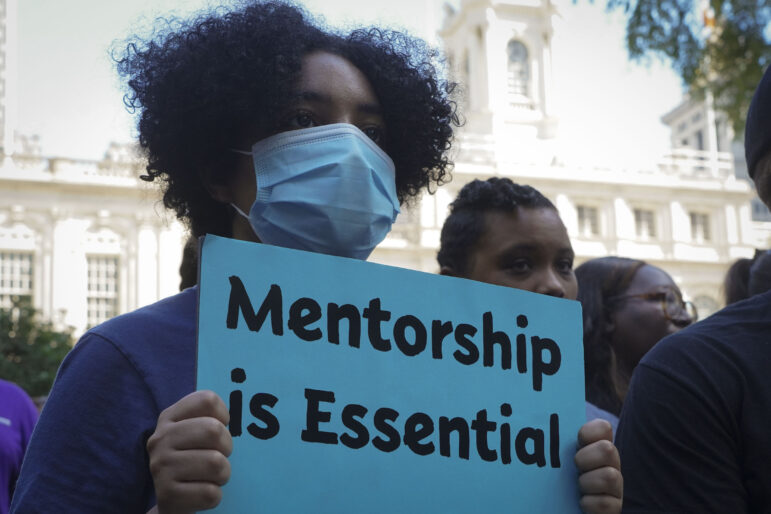“I am devastated by the abrupt, violent pulling of this program,” said Jonathan McLean, chief executive officer of the Center for Alternative Sentencing and Employment Services, at a City Hall rally Tuesday.

Lea la versión en español aquí.
Donning shirts of various colors, members representing more than a dozen nonprofit organizations joined together at City Hall Park Tuesday to protest the city’s decision to cut a nearly decade-old program that mentors NYCHA youth.
The NextSTEPS Coalition, which stands for “Striving Towards Engagement and Peaceful Solutions” is made up of groups that help at-risk teens and young adults between the ages of 16 and 24.
The groups have staff mentors known as credible messengers, including NYCHA residents, some of whom had unstable upbringings themselves or experienced incarceration. Services provided through NextSTEPS include attending court cases, connecting participants with public assistance resources and even providing help to attain a driver’s license.
But on Aug. 24, NextSTEPS members received an email from the New York City Department of Probation (DOP) informing them of the termination of their contracts, and explaining that the program would have to cease within days, on Aug. 31. A subsequent email offered an extension until Sept. 22nd, according to Manhattan nonprofit Good Shepherd Services.
“I am devastated by the abrupt, violent pulling of this program,” Jonathan McLean, chief executive officer of the Center for Alternative Sentencing and Employment Services (CASES), told the crowd on Tuesday.
The nonprofit, which works with youth at NYCHA’s Tompkins Houses in Brooklyn’s Bed-Stuy neighborhood, helps at-risk teens and young adults connect with education and employment opportunities while providing services such as at-home therapy.
“People often say to me: ‘It’s amazing you grew up in the projects, you did 16 years in prison, you turned your life around’—that’s all well and good,” McLean said. “But what would’ve happened to someone like me, who didn’t get the opportunity to turn their lives around?”
Reached for comment, a DOP spokesperson confirmed that the program is being suspended, attributing the decision to an annual evaluation.
“Our young people in NYCHA deserve the best resources and support that New York City has to offer, and that is what the Department of Probation provides,” DOP wrote in an email. “Based on a thorough annual evaluation, DOP has determined that young New Yorkers living in public housing can get the mentorship support they deserve through other existing programs and will not renew this $2.5 million program.”
The agency said that other DOP and citywide mentorship programs—including Arches, Blue Chips and Girl Talk—will still be available.
Dedric Hammond, also known as “Be-Loved,” is a credible messenger who works with a NextSTEPS organization called Living Redemption Community Development Corporation. Based in Harlem, the group works with 200 young residents living in NYCHA’s Saint Nicholas Houses.
He said the organization provided a “living room effect” for its participants to let their guards down.
“The reason why NextSTEPS was so potent and so great is because you’re going out into the community where hell and hurt and pain lies,” Hammond said. “[The mentors] are a listening ear at three and four in the morning when the youth are thinking about causing harm or harming themselves—they had mentors, they had access.”
NextSTEPS was introduced in 2014 under former Mayor Bill de Blasio, who implemented the Mayor’s Action Plan for Neighborhood Safety (MAP). That year, the Mayor’s Office of Criminal Justice had reported a drop in crime across the city but found consistent infractions remained in public housing communities.
The office then identified 15 NYCHA developments that made up roughly 20 percent of the violent crime within the housing authority. These areas were the target for additional resources.
Damien Myrick, the program director for Good Shepherd Services, shared some of the successes from his program.
One alumnus, he said, came from an unstable household and later went on to serve in the military. He now works with the New York City Fire Department. This past year, seven participants enrolled in college.
“I’m emotional right now because it hurts,” Myrick said.
Brooklyn Councilmember Lincoln Restler slammed the DOP for having the “chutzpah” to halt services at NextSTEPS.
“Years of great work down the drain, up in smoke, eliminated within hours of notice,” Restler said. “It is shameful that this mayor and the Department of Probation fails to respect the tremendous work that each and every one of these nonprofits do every single day.”
Makeba Reece, a mentor with Living Redemption Community Development Corporation, participated in Arches Transformative Mentoring Program, which was introduced under former Mayor Michael Bloomberg in 2012 and is one of the programs still funded by the city.
Arches links young adults with mentors during their probation—a period when convicted offenders must follow regiments such as meeting curfew, passing drug tests and having no contact with any known offenders.
Similar to NextSTEPS, Arches connects participants with credible messengers who can offer help to find employment, educational opportunities and advice.
“I’m a product of a mentorship program and look at me now giving back,” Reece said. “At the end of the day, we’re tired of going to funerals, we’re tired of going to hospitals to visit our babies in the ER, and this was saving us from enduring that pain.”
If the elimination of NextSTEPS is not reversed, Reece said informal mentorship will continue on regardless.
Ahmed Rodriguez, the director of community engagement and mediation at NYCHA’s Queensbridge Houses, shared that as a youth, he too was once a recipient of services. Now, in a position to provide them, Rodriguez said he wants to encourage young people to lift their voices.
“The one thing I’ll say is great about today is that we’re able to bring our young participants to help them understand that when they are uncomfortable and justice is not being done, they have an opportunity to say something,” he said.
To reach the reporter behind this story, contact Tatyana@citylimits.org. To reach the editor, contact Emma@citylimits.org.








